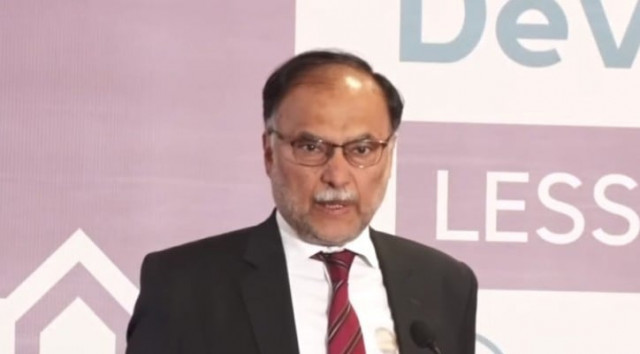TLP pact not approved by then-PM: Ahsan
Minister tells commission negotiators showed agreement to Abbasi after signing it

Planning Minister Ahsan Iqbal has disclosed before the Faizabad inquiry commission that negotiators signed an agreement with the Tehreek-e-Labbaik Pakistan (TLP) in November 2017 without obtaining endorsement from then-prime minister Shahid Khaqan Abbasi.
Iqbal, who served in Abbasi's cabinet as the interior minister, stated that the former PM had raised objections to the agreement with the protestors. However, he was informed that since the agreement had been signed, the government could not retract its stance.
Earlier this week, the Faizabad sit-in probe commission cleared spy agencies as well as former spymaster Lt Gen (retd) Faiz Hameed, emphasizing that high-ups of the then government did not accuse agency officials of aiding the TLP protestors in 2017.
Instead, the three-member commission held the political leadership, including the then Punjab chief minister – now the prime minister – Shehbaz Sharif, among others, responsible for allowing the TLP protestors to enter Islamabad without resistance due to fears of losing their vote bank.
In November last year, a caretaker government formed a three-member commission to identify those who planned, financed, and supported the sit-in in the Faizabad area, which disrupted life in the twin cities of Rawalpindi and Islamabad between November 6 and November 27, 2017.
In its report, released on Tuesday, the commission observed that high-ups of former provincial and federal governments did not accuse the agencies or any other officials of aiding the TLP protestors, and no evidence to the contrary was presented.
"Since no one, including the former prime minister, former interior minister, former law minister, and former chief minister of Punjab, accused intelligence agencies or any other officials of facilitating the protestors, nor was any other evidence brought forward, the commission could not implicate any organization or state official in supporting the TLP to organize the dharna."
According to the report, Shahid Khaqan Abbasi, Ahsan Iqbal, former law minister Zahid Hamid, former Punjab chief minister Shehbaz Sharif, and former Intelligence Bureau (IB) chief Aftab Sultan were specifically questioned about the alleged role of agencies in facilitating the march. "They all denied the involvement of any organ or person of the state in such activity," the report stated.
It added that Iqbal informed the commission that, lacking alternatives, the federal government engaged the Inter-Services Intelligence (ISI) to communicate with the TLP leadership and sign an agreement that ended the protest.
The report noted that Lt-Gen (retd) Faiz Hameed, who was a major general at the time and held the position of director general (C) in the ISI, had to sign the agreement on behalf of the security establishment as a mediator between the two parties with the permission of the then ISI chief and the chief of army staff.
Based on the available records, the commission concluded that the Faizabad sit-in was more a result of the lack of courage or conviction of the leader handling the issue, particularly the Punjab government. It stated that both the provincial and federal governments hesitated in addressing the issue at the initial stage.
The report also highlighted differing approaches of the federal government and the Punjab government in dealing with the issue. While Abbasi initially urged the Punjab government to contain the protest within its jurisdiction, Chief Minister Shehbaz "advised them to allow the TLP to proceed to Islamabad."
The commission, led by Syed Akhtar Ali Shah, a former civil servant who also served as Khyber-Pakhtunkhwa’s police chief, included Tahir Alam Khan, a former IG of Islamabad, and Khushal Khan, an additional secretary at the Ministry of Interior.
In its report spanning 149 pages, with 57 annexures and sub-annexures, and one appendix, the commission also highlighted a lack of coordination between Rawalpindi and Islamabad police. During the sit-in, seven people were killed, and 277, including police and FC officials, were injured.
Minister for Planning, Development and Special Initiatives Professor Ahsan Iqbal. PHOTO: APP
Minister for Planning, Development and Special Initiatives Professor Ahsan Iqbal. PHOTO: APP



















COMMENTS
Comments are moderated and generally will be posted if they are on-topic and not abusive.
For more information, please see our Comments FAQ